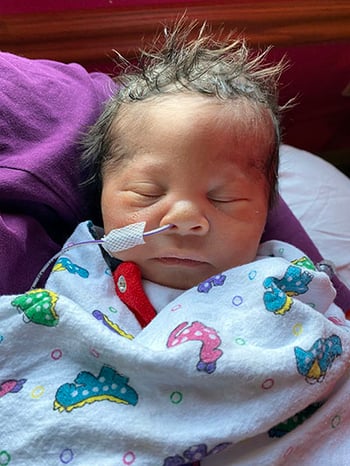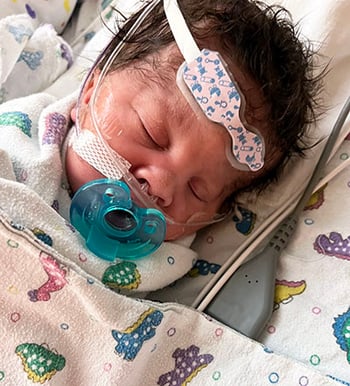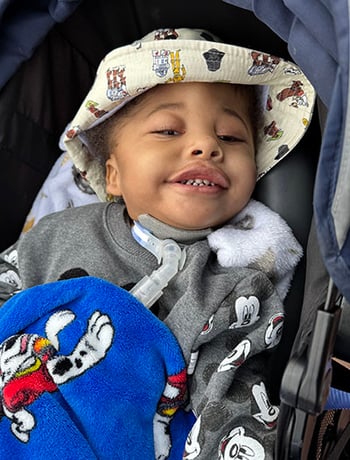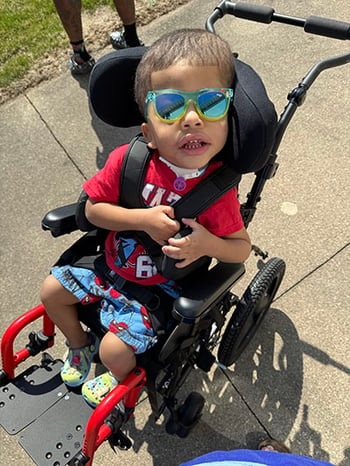
“Don’t sugarcoat it for me,” Darrius Barber recalled telling the doctor. “Just tell me what’s going to happen. What do I need to expect?”
But there were no easy answers.
A few weeks earlier, Darrius’ wife, Amanda, had gone to her doctor near their home in Appleton for her 20-week anatomy ultrasound. The exam showed fluid in the baby’s head — a sign that development wasn’t progressing typically. They were referred to the Fetal Concerns Center at Children’s Wisconsin for additional tests.
As Amanda’s pregnancy advanced, the fluid in the baby’s head grew. And so did the family’s fear over what lay ahead for their little boy.
A Bumpy Beginning
 On Jan. 5, 2023, about a month before his due date, Ben was born via Cesarean section at the Froedtert Hospital Birth Center. He was immediately taken down the hall to the Children’s Wisconsin Neonatal Intensive Care Unit (NICU).
On Jan. 5, 2023, about a month before his due date, Ben was born via Cesarean section at the Froedtert Hospital Birth Center. He was immediately taken down the hall to the Children’s Wisconsin Neonatal Intensive Care Unit (NICU).
“He was beautiful,” said Darrius. “He was the best version of Ben that we could ask for.”
During an initial examination, a geneticist picked up Ben’s feet and noted that his one of his toes on each foot looked underdeveloped — a classic sign of Coffin-Siris syndrome, a genetic disorder so rare that there are only a few hundred known cases worldwide. Genetic testing confirmed the diagnosis.
Thankfully, Ben found himself in the best possible place for such a condition. The Children's Wisconsin Undiagnosed and Rare Disease Program is designated as a Diagnostic Center of Excellence by the National Institutes of Health Undiagnosed Diseases Network. Part of an elite group of institutions, doctors and researchers at Children’s Wisconsin provide clinical and investigative expertise for the most challenging cases.
While the symptoms and severity of Coffin-Siris can vary, the condition often involves differences in the head and face, developmental delays, challenges with eating and breathing, low muscle tone, hearing loss and issues with other organ systems.
Ben endured multiple major surgeries in his first weeks of life to repair a heart defect and a diaphragmatic hernia (a hole in the muscle between his chest and abdomen). He stayed in the NICU for 71 days. Darrius took off work for six months to remain by Ben’s bedside in Milwaukee while Amanda stayed back in Appleton to work and care for their older son, Isaiah, who was then a toddler and very much a “mama’s boy.”
For Amanda, who struggled with postpartum depression, only getting to see Ben two days a week was agonizing. She and Darrius talked over the phone and video whenever they could, but it never felt like enough. “I miss Daddy and Baby Ben,” Isaiah would say.
The family was finally reunited when Ben was discharged on March 20. Then, less than a week after being home, Darrius and Amanda heard him give a wet-sounding cough in the wee hours of the morning. Ben was gray. “Like a zombie in a zombie movie,” said Darrius. Their home pulse oximeter indicated that Ben’s oxygen saturation level was terrifyingly low.
That was the first of many times that Darrius and Amanda would call 911 for Ben. After a brief stop at the Children’s Wisconsin Fox Valley Hospital, Ben was on his way back to the Milwaukee Hospital.
Ben’s parents later learned that he had refluxed during the night, which had triggered pneumonia and then a respiratory crisis because of his smaller left lung. Ben remained in the Pediatric Intensive Care Unit (PICU) for 87 days, until June 13, while Darrius remained by his side around the clock.
Nancy Rose, Rebecca Foley and Myah Vlahogenius became Ben’s primary nurses in the hospital and a support system for Amanda and Darrius, who don’t have family nearby.
“I will be your PICU mama,” Nancy told Amanda when she broke down one day.
“Our nurses are what pushed us through,” said Amanda. “We relied on the nurses for support, and they embraced us with open arms. I don’t think I could have done it without any of them.”
Persevering Through Setbacks
 During that long PICU stay, the care team tried again and again to wean Ben off his breathing tube, but Ben continued to struggle without supplemental oxygen.
During that long PICU stay, the care team tried again and again to wean Ben off his breathing tube, but Ben continued to struggle without supplemental oxygen.
Darrius will never forget the traumatic morning when Ben went into cardiac arrest around 4:15 a.m. “He’s gone,” Darrius thought as he watched the PICU team perform emergency CPR.
But then, after nearly 4 minutes, Ben’s heart fluttered back to life.
Ben’s care team later recommended a tracheostomy — a surgical procedure that places a breathing tube directly into the windpipe — to prevent future respiratory emergencies. Ben already had a gastrostomy tube (g-tube) inserted into his stomach for nutrition, and Amanda was initially reluctant to do the tracheostomy because she worried it would hurt him.
One day in the PICU, she sobbed just thinking about it.
“Amanda, you can do this,” Nancy told her, squeezing her hands. “Ben can do this. Let me teach you how to take care of him.”
With the help of the Children’s Wisconsin Tracheostomy and Home Ventilator Program, Amanda and Darrius learned how to handle the medical equipment in every scenario.
“Something that was once the scariest thing to us is now a safeguard,” said Amanda.
Ben went home four weeks after his tracheostomy, but he returned to Children’s Wisconsin for other reasons: visits with the DREAM (Developmentally Ready Engagement for Achievement of Milestones) Clinic, a repair for a groin hernia, ear tubes, a shunt surgery to drain fluid from his brain, seizures triggered by a broken leg, plus several emergency hospitalizations for respiratory illnesses. One emergency hospital trip came less than 24 hours into the family’s long-awaited trip to Disney World.
“When Ben gets sick, he’s sick,” said Darrius. “There is no slow buildup like with you and me. Ben’s off a cliff. He’s 0 to 60 in a second.”
Although life has calmed down now that Ben is almost 3 years old, the fear is never far away. When Darrius wakes up, the first thing he looks at is Ben’s pulse oximeter, seeking reassurance in the oxygen saturation numbers. Then he looks at his slumbering son’s face, feeling like his heart is outside his chest.
“The hardest part with a kid like Ben is the fear,” said Darrius. “The constant fear of every cough, every time he appears different. It’s a constant fear, every second of every day.”
Support For the Whole Family
 Throughout it all, Ben’s care team at Children’s Wisconsin has felt like an extension of family, right down to their frequent reminders to Ben’s parents about the importance of self-care.
Throughout it all, Ben’s care team at Children’s Wisconsin has felt like an extension of family, right down to their frequent reminders to Ben’s parents about the importance of self-care.
“That support system is important when you experience something like this,” said Darrius.
Ben has had many standout providers from nearly every specialty at Children’s Wisconsin. Among the doctors that Ben has bonded with are Pediatric Neurosurgeon Elsa Arocho-Quinones, MD, and Pediatric Pulmonologist Julie Noe, MD.
“We’ve had some really, really good doctors,” said Darrius.
Another key support has been Sara Quates, APNP, from the Complex Care Program. The program, which serves nearly 800 patients and their families, has been a national leader in providing care coordination and medical co-management for kids with medical complexity and fragility.
Sara has been a strong advocate for Ben when his family has run into challenges. “If I was in a street fight, I would want her there,” said Darrius with a chuckle. “She is a bulldog.”
But Sara is quick to point out that she’s just one of many people on Ben’s team.
“Ben’s family is really the heart and cornerstone of Ben’s journey,” said Sara. “Sometimes folks think when you’re talking about pediatrics, you’re just talking about the child. But with all children, it’s the family that surrounds them, it’s their parents, their siblings, the community partners, the in-hospital partners, the out-of-hospital partners, that really allow the child to thrive.”
Care Close to Home
Fortunately, Ben can receive much of his routine care close to his Appleton home. The family’s primary care pediatrician, Jennifer Hunt, MD, works at ThedaCare and came recommended by Ben’s care team at Children’s Wisconsin. The Connected for Kids initiative, a partnership between Children’s Wisconsin, ThedaCare and Emplify Health by Bellin, ensures seamless care for kids in Northeast Wisconsin.
Shortly after Ben was born, Children’s Wisconsin opened the Appleton Clinic to offer expanded specialty care to kids in the region. That has made it much easier to manage Ben’s therapy and specialist appointments, which require two to four visits a week.
“Having the Appleton Clinic really does save time,” said Darrius. “It’s 15 minutes from our house.”
One of Ben’s weekly therapy appointments is with Physical Therapist Anna Lopas, PT, DPT, NTMTC, and Occupational Therapist Cassaundra Pulvermacher, MS OTR/L. Anna and Cassaundra treat Ben together so they can work on skills simultaneously without tiring out Ben. After months of therapy, Ben has gone from nearly completely immobile to rolling, scooting, playing and interacting with his environment.
“Ben is a social, fun little guy to work with,” said Cassaundra. “His smile is contagious, and seeing how far he has come since we started services is truly amazing and an inspiration. He has a very complex medical history but continues to make beautiful gains and surprise us every week. It is truly incredible to not only see the motor wins but also his personality come to life.”
During one memorable visit last December, Ben balanced on a ball in the therapy gym. Suddenly, he lifted his head for the first time.
“Ben responded to his dad’s voice, looked up and was trying to find him,” said Anna. “It was a sweet moment.”
Darrius was so stunned to witness Ben’s new head control that he sobbed. “It just made me so happy for him,” he said.
Ben also sees Speech Therapist Meghan Waschow, MS, CCC-SLP, and Occupational Therapist Amanda DeBauche, MS, OTR/L, for co-treatment every week.
“Meghan and Amanda are also very diligent in helping Ben not just get stronger but also to be able to communicate in the best way possible for him,” said Darrius.
Celebrating Ben’s Progress
 With rare syndromes like Coffin-Siris, it can be difficult to know what’s ahead for development. But with the support of Children’s Wisconsin, Ben’s family continues to do whatever they can to nurture Ben’s progress.
With rare syndromes like Coffin-Siris, it can be difficult to know what’s ahead for development. But with the support of Children’s Wisconsin, Ben’s family continues to do whatever they can to nurture Ben’s progress.
“I will often tell families that parents and the care team have goals, and it is the child’s job to do their best to reach their best potential,” said Sara. “It’s our job to make sure that all those supports are in place so that they can do their best. And Ben’s family just really strives to do that.”
“We have to give Ben the best life for Ben,” said Darrius. “That life for Ben might be different from his brother Isaiah. It might be different from Joey down the street.”
And despite all the bumps in Ben’s journey, he is a cheerful and resilient child. “He’s just the happiest baby,” said Amanda. “He exudes joy. When you see him and you’re around his spirit, you can’t help but smile.”
After spending so much of his early life surrounded by medical professionals, Ben loves grasping people’s hands. He enjoys toys that light up and make noise, including his favorite maraca toy. And he is fascinated by his big brother. “If Isaiah’s there, he gets 100% of Ben’s focus,” said Darrius.
Ben brings his family plenty of joy in return. “That kid has my heart in a way that I didn’t think was possible,” said Darrius.
Parenting a child with a rare disease is never easy, but Darrius and Amanda are grateful that the Children’s Wisconsin team is never far away.
"When you’re in the fire,” said Darrius, “it helps knowing that they care, too."
Children's Wisconsin Resources

Written by
Nicole Sweeney Etter
Writer
Children's Wisconsin specialty care providers have advanced training and expertise in many areas of pediatric medical care, including allergies, dental, dermatology, emergency medicine, ENT, gastroenterology, neonatology, surgery and more.
Related Stories
No related articles found.



